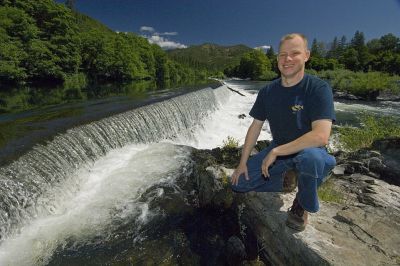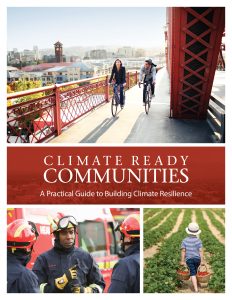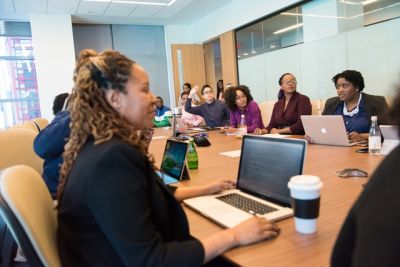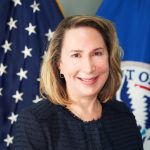Making it easy for communities to build climate resilience
At Geos Institute, we believe every community should be equipped to build climate resilience, no matter its size, location, or wealth. That belief drives everything we do.
That is why we developed Climate Ready America, a bold, national initiative designed to make high-quality climate services available and actionable in every corner of the country. It is also why we created Climate Ready Communities, an open-access planning toolkit, to share our expertise with communities that cannot afford a consultant. And, it is why we support innovative public-private partnerships like the Drinking Water Providers Partnership and the Climate Smart Communities Initiative, which help fund locally led projects that protect both people and nature.
Think of us as a head coach: we look at the big picture, connect the right people, and set up the support systems that help local leaders step into action with confidence and support. When communities win, we all win.
Collaborating for greater impact
A nationwide infrastructure for resilience
Climate Ready America connects local needs with climate experts. It is a network of Climate Innovation Centers and Navigators that support communities and strengthen the field. To build this, we partner with allied organizations across every state and territory who provide direct support to local leaders across the country. Together, they solve regional challenges, share solutions, and speed up climate progress. Oversight and strategy come from our National Strategy Team and a group of expert advisors from across the field.
Turning partnerships into real-world progress
We co-founded the Drinking Water Providers Partnership, an innovative public-private partnership, which brings together federal and state agencies and nonprofits to support watershed restoration projects that protect community drinking water supplies in Oregon and Washington.

Making climate resilience accessible to every community
Resources and support for every state, territory, and Tribe
Through Climate Ready America, local leaders across the country can access the tools, resources, and expert help they need – right in their own Climate Innovation Center. Navigators offer targeted support to under-resourced communities, helping them access funding, find experts, and meet their goals.
 Sharing what we know in the Practical Guide to Building Climate Resilience
Sharing what we know in the Practical Guide to Building Climate Resilience
We created Climate Ready Communities to help all communities make climate resilience plans—especially those who cannot afford a consultant. The program is built around our free Practical Guide to Building Climate Resilience, which we are updating to include both climate adaptation and mitigation. Communities that want to take action shouldn’t be left behind just because they have limited resources.
Helping communities connect with climate experts
As a founding member of the Climate Smart Communities Initiative, we help connect local leaders with skilled climate experts through the Adaptation Registry. We also offer an annual funding opportunity for community-practitioner project teams and provide expert help through a climate resilience Help Desk.
Leveraging what works
Supporting local leadership and scaling proven solutions
Through Climate Ready America, we leverage and support the work already being done in each state, territory, and Tribe. We partner with local organizations to take the lead, while we provide guidance, support, and assistance. Climate Ready America also creates a pathway to more easily connect climate service programs and providers to the communities that need them the most.

What makes us different?
- We focus on the big picture while supporting the people who are making change happen on-the-ground.
- We collaborate with other climate service providers to help get their tools, trainings, and resources in the hands of the local leaders who need them most.
- We coach, train, and support our in-state partners as needed to make the most effective climate services possible.
- We prioritize durable, nature-based climate solutions that care for both ecosystems and communities.
- We prioritize equity, ensuring communities that often get left out get the opportunity to lead.
- We build systems designed to expand to provide solutions at the scale of the climate crisis.
- We have been honored for our work, including the “Achievement in Community Engagement” award from the Oregon Department of Land Conservation and Development and the Lightship Prize for Climate Action.

 Robert Macnee, Ph.D. is Deputy Director of Resilience Services at Climate Resilience Consulting, where he helps governments, institutions, and communities reduce climate risk in equitable and practical ways. He holds a Ph.D. in Environmental Management focused on climate change impacts on health and communities, and brings over a decade of experience spanning economic development, resilience planning, and implementation.
Robert Macnee, Ph.D. is Deputy Director of Resilience Services at Climate Resilience Consulting, where he helps governments, institutions, and communities reduce climate risk in equitable and practical ways. He holds a Ph.D. in Environmental Management focused on climate change impacts on health and communities, and brings over a decade of experience spanning economic development, resilience planning, and implementation. Samantha Medlock is President of Climate Risk Advisors, helping communities and organizations advance equity, sustainability, and resilience. Her career began chasing floods as a local official in Texas Flash Flood Alley—a hands-on experience that still shapes her approach to climate and disaster risk management.
Samantha Medlock is President of Climate Risk Advisors, helping communities and organizations advance equity, sustainability, and resilience. Her career began chasing floods as a local official in Texas Flash Flood Alley—a hands-on experience that still shapes her approach to climate and disaster risk management.
 Jim is a multilingual world traveler. Based in Bavaria during the 1970s, Jim spent most of this period in India, Afghanistan and Nepal, where he founded and operated a charitable medical clinic serving Tibetan Refugees. He settled in Oregon in 1983 on a forested ranch in the Umpqua National Forest.
Jim is a multilingual world traveler. Based in Bavaria during the 1970s, Jim spent most of this period in India, Afghanistan and Nepal, where he founded and operated a charitable medical clinic serving Tibetan Refugees. He settled in Oregon in 1983 on a forested ranch in the Umpqua National Forest. Dr. Micah Hahn is an Associate Professor of Environmental Health in the Institute for Circumpolar Health Studies at the University of Alaska-Anchorage. She received her joint PhD in Epidemiology / Environment and Resources from the University of Wisconsin-Madison and her MPH in Global Environmental Health from Emory University. Subsequently, she was a postdoctoral fellow for the CDC Climate and Health Program, and in this position worked collaboratively with the CDC Division of Vector-borne Diseases and the National Center for Atmospheric Research. Her research focuses on understanding the health impacts of climate change and working with communities to develop locally-relevant adaptation and resilience-building strategies. Dr. Hahn is also on the Management Team of the Alaska Climate Adaptation Science Center.
Dr. Micah Hahn is an Associate Professor of Environmental Health in the Institute for Circumpolar Health Studies at the University of Alaska-Anchorage. She received her joint PhD in Epidemiology / Environment and Resources from the University of Wisconsin-Madison and her MPH in Global Environmental Health from Emory University. Subsequently, she was a postdoctoral fellow for the CDC Climate and Health Program, and in this position worked collaboratively with the CDC Division of Vector-borne Diseases and the National Center for Atmospheric Research. Her research focuses on understanding the health impacts of climate change and working with communities to develop locally-relevant adaptation and resilience-building strategies. Dr. Hahn is also on the Management Team of the Alaska Climate Adaptation Science Center. Michael is a former Founding Principal of Resilient Cities Catalyst, a global non-profit helping cities and their partners tackle their toughest challenges. He is currently the Executive Director of Climate Resilience Academy at the University of Miami.
Michael is a former Founding Principal of Resilient Cities Catalyst, a global non-profit helping cities and their partners tackle their toughest challenges. He is currently the Executive Director of Climate Resilience Academy at the University of Miami. Dr. Quintus Jett is a consultant, educator, and strategist for public causes. He has a doctorate in Organizations & Management from Stanford University, and a two-decade faculty career which spans schools, departments, and programs of business, engineering, liberal studies, divinity, and public and nonprofit management. Following Hurricane Katrina in 2005, Dr. Jett launched a volunteer project in New Orleans, which enlisted residents, students from over a dozen colleges and universities, and hundreds of others to field map the city’s Gentilly district, Lower Ninth Ward, and New Orleans East. Dr. Jett is an innovator in higher education, bridging the divide between academic research and the other priorities of the modern university, including student access and diversity, community engagement, and providing foundations for life-long learning in today’s rapidly changing world.
Dr. Quintus Jett is a consultant, educator, and strategist for public causes. He has a doctorate in Organizations & Management from Stanford University, and a two-decade faculty career which spans schools, departments, and programs of business, engineering, liberal studies, divinity, and public and nonprofit management. Following Hurricane Katrina in 2005, Dr. Jett launched a volunteer project in New Orleans, which enlisted residents, students from over a dozen colleges and universities, and hundreds of others to field map the city’s Gentilly district, Lower Ninth Ward, and New Orleans East. Dr. Jett is an innovator in higher education, bridging the divide between academic research and the other priorities of the modern university, including student access and diversity, community engagement, and providing foundations for life-long learning in today’s rapidly changing world. Scott is Monfort Professor of Atmospheric Science at Colorado State University. He has written about 100 publications in the peer-reviewed climate literature, is a former editor of the Journal of Climate, and served for five years as founding Science Chair of the North American Carbon Program.
Scott is Monfort Professor of Atmospheric Science at Colorado State University. He has written about 100 publications in the peer-reviewed climate literature, is a former editor of the Journal of Climate, and served for five years as founding Science Chair of the North American Carbon Program. Linda has many years of experience in disaster preparedness and resilience. She has been an elected official on the Linn County Iowa Board of Supervisors, Chair of the Metropolitan Planning Organization, the East Central Iowa Council of Governments, the statewide Mental Health Developmental Disability and the Linn County Board of Health. Langston is a former president of the National Association of Counties (2013-2014).
Linda has many years of experience in disaster preparedness and resilience. She has been an elected official on the Linn County Iowa Board of Supervisors, Chair of the Metropolitan Planning Organization, the East Central Iowa Council of Governments, the statewide Mental Health Developmental Disability and the Linn County Board of Health. Langston is a former president of the National Association of Counties (2013-2014). Ken works with families and organizations as a mediator, organizational consultant, trainer and facilitator. Along with his passion for helping people prepare for and reduce climate change, Ken also volunteers as a mediator through Mediation Works and is passionate about supporting youth through mentoring with Boys to Men of Southern Oregon.
Ken works with families and organizations as a mediator, organizational consultant, trainer and facilitator. Along with his passion for helping people prepare for and reduce climate change, Ken also volunteers as a mediator through Mediation Works and is passionate about supporting youth through mentoring with Boys to Men of Southern Oregon. Matthew is a retired high school teacher who was once honored as Oregon High School Social Studies Teacher of the Year. Before his teaching career he was in the restaurant business in Portland. He is also a lawyer who has been a member of the Oregon State Bar Association since 1980.
Matthew is a retired high school teacher who was once honored as Oregon High School Social Studies Teacher of the Year. Before his teaching career he was in the restaurant business in Portland. He is also a lawyer who has been a member of the Oregon State Bar Association since 1980. Andrea is the Resilience Policy Advisor for the North Carolina Office of Recovery and Resiliency. She works across state agencies and with local governments to increase the state’s resilience to the impacts of climate change.
Andrea is the Resilience Policy Advisor for the North Carolina Office of Recovery and Resiliency. She works across state agencies and with local governments to increase the state’s resilience to the impacts of climate change.